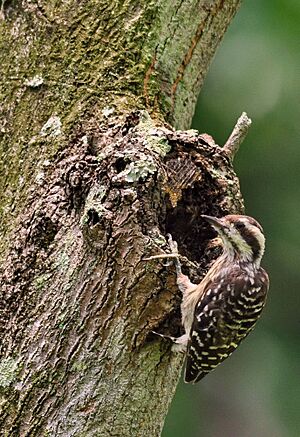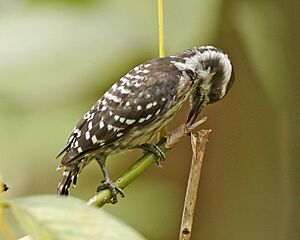Sunda pygmy woodpecker facts for kids
Quick facts for kids Sunda pygmy woodpecker |
|
|---|---|
 |
|
| Conservation status | |
| Scientific classification |
|
| Kingdom: | Animalia |
| Phylum: | Chordata |
| Class: | Aves |
| Order: | Piciformes |
| Family: | Picidae |
| Genus: | Yungipicus |
| Species: |
Y. moluccensis
|
| Binomial name | |
| Yungipicus moluccensis (Gmelin, JF, 1788)
|
|
| Script error: The function "autoWithCaption" does not exist. | |
| Synonyms | |
|
Picoides moluccensis |
|
Script error: No such module "Check for conflicting parameters".
The Sunda pygmy woodpecker (Yungipicus moluccensis) is a small and active bird. It is also known simply as the Sunda woodpecker. This bird belongs to the Picidae family, which includes all woodpeckers. You can find these interesting birds in countries like Brunei, Indonesia, Malaysia, and Singapore.
Contents
What Does the Sunda Pygmy Woodpecker Look Like?
This woodpecker is quite small, usually about 13 centimeters (around 5 inches) long. It has a greyish-brown cap on its head. Its ears are covered in dark brown, with two lighter, whitish-grey stripes that get narrower towards its neck.
The upper part of its body is greyish-brown. Its wings are white at the tips, making them look striped. The tail is short and blackish with white bands. The area around its beak and its throat are white, leading to a dirty white color on its belly. The upper chest has brown streaks, which become less noticeable towards the bottom.
How Can You Tell Males and Females Apart?
Male and female Sunda pygmy woodpeckers look a bit different. This is called being dimorphic. Males have a reddish-orange crown (the top of their head), but females do not have this colorful patch.
Where Do Sunda Pygmy Woodpeckers Live?
Sunda pygmy woodpeckers live in several types of natural habitats. They prefer warm, wet forests. You can find them in:
- Lowland forests that are moist and tropical.
- Mangrove forests, which are special forests that grow in salty water along coastlines.
- Montane forests, which are moist and tropical forests found in mountainous areas.
How Do These Woodpeckers Behave?
These woodpeckers are common visitors to both city areas and forests, especially in Singapore. They are often seen alone or in pairs. They move very quickly up and down trees. You can spot them from the ground all the way up to the highest branches, often on dead parts of trees. They are always busy looking for food!
Images for kids
 | Aaron Henry |
 | T. R. M. Howard |
 | Jesse Jackson |




